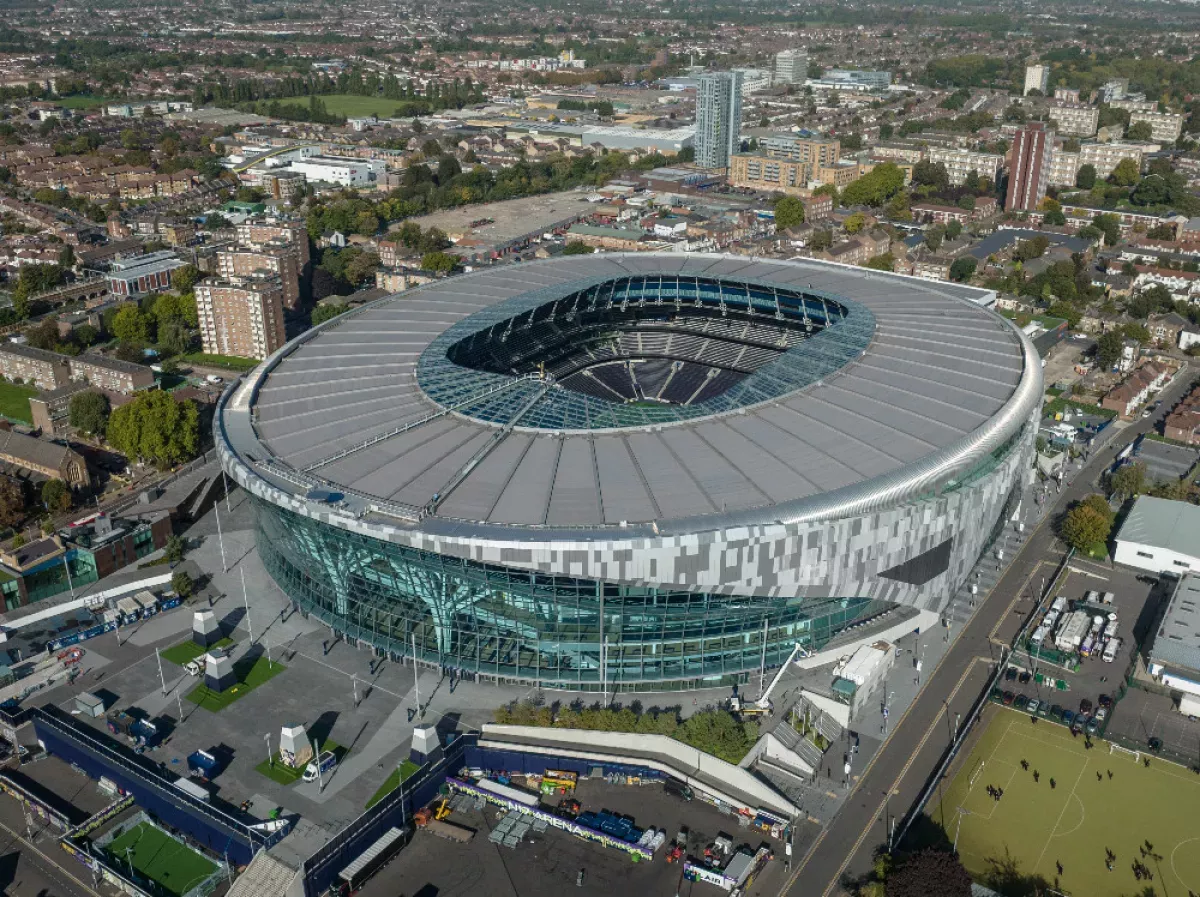Tottenham Hotspur Stadium is a multi-purpose stadium in North London, home to Tottenham Hotspur and NFL London Games. Replacing White Hart Lane, it boasts a 62,850 seating capacity, making it the 3rd largest football stadium in England and the largest club ground in London. A key feature is its dividing, retractable football pitch, which reveals a synthetic turf field underneath for NFL games, concerts and other events, making it highly versatile.
1909: Original Spurs Cockerel Creation
In 1909, the original spurs cockerel was created. It was placed on top of the west stand at White Hart Lane. A replica of this cockerel, including dents caused by Paul Gascoigne, was placed above the South Stand in November 2018.
April 2008: Considering Acquisition of Wingate Trading Estate
In April 2008, Tottenham Hotspur considered acquiring the Wingate Trading Estate to the north of White Hart Lane for stadium construction.
April 2009: Release of First Plan for Public Consultation
In April 2009, the first plan for the Northumberland Development Project, which included a 58,000-capacity stadium, was released for public consultation.
October 2009: Planning Application Submitted
In October 2009, a planning application for a 56,000-seat stadium, designed by KSS Design Group, was submitted as part of the Northumberland Development Project.
May 2010: Revised Plan Resubmitted
In May 2010, a revised plan for the stadium, retaining some listed buildings, was resubmitted in response to objections from conservation groups.
September 2010: Revised Plan Accepted by Haringey Council
On 30 September 2010, the revised stadium plan was accepted by Haringey Council, and later by the Mayor of London and the government.
August 2011: Riot in Tottenham
In August 2011, a major riot occurred in a deprived area of Tottenham.
September 2011: Planning Permission Issued
On 20 September 2011, Haringey Council issued planning permission for the Northumberland Development Project and removed the demand for community infrastructure payments.
January 2012: Club Commits to Building Stadium in Tottenham
In January 2012, Tottenham Hotspur committed to building the stadium in Tottenham after losing the bid for the Olympic Stadium.
January 2012: Tottenham Announces Stay in North Tottenham
In January 2012, Tottenham announced it would stay in North Tottenham and work with Haringey Council to rejuvenate the area.
March 2012: Haringey Council Approves Land Handover
In March 2012, Haringey Council approved plans to hand over council-owned land, including part of Wingate Trading Estate, to Spurs for the redevelopment project.
September 2012: Building Work Started
Building work on the Northumberland Development Project started in September 2012.
October 2013: Consideration of Multi-Use Stadium
In October 2013, it was revealed that Tottenham Hotspur was considering a new plan for a multi-use stadium that could host American football games.
July 2014: Confirmation of Compulsory Purchase Order
On 11 July 2014, the Secretary of State confirmed the Compulsory Purchase Order (CPO) for the remaining properties on Paxton Road.
2014: Land Cleared North of Stadium
By 2014, a large part of the land north of the existing Tottenham Hotspur stadium had been cleared while the CPO dispute was ongoing.
March 2015: Acquisition of Remaining Plots
On 31 March 2015, the remaining plots on Paxton Road were acquired, allowing the Northumberland Development Project to proceed.
July 2015: Agreement with NFL and New Design Team Announced
On 8 July 2015, Tottenham Hotspur announced an agreement with the NFL to host a minimum of two NFL games per year for 10 years starting in 2019, and a new design team led by Populous for the stadium design was also announced.
December 2015: Revised Plans Approved by Haringey Council
In December 2015, Haringey Council approved revised plans for the stadium, including the demolition of locally listed buildings.
December 2015: Interim Financing Facility Arranged
In December 2015, a £200 million interim financing facility was arranged with three banks to finance the Tottenham Hotspur Stadium project.
2015: Stadium Construction Commenced
In 2015, construction of the Tottenham Hotspur stadium commenced after the resolution of the CPO dispute. Preliminary work on the basement started in the summer of 2015, with concrete and ground works following in autumn.
February 2016: Final Approval Given
In February 2016, final approval was given for the Northumberland Development Project, allowing the main structure of the new stadium to begin construction.
February 2016: Formal Approval by Mayor of London
In February 2016, the Mayor of London gave formal approval to the stadium plans.
2016: White Hart Lane Used During Construction
In 2016, White Hart Lane was still used during the 2016–17 season while construction of the new stadium was in progress.
May 2017: Five-Year Loan Deal Secured
In May 2017, a £400 million, five-year loan deal was secured with banks to fund the remaining build of Tottenham Hotspur Stadium. By this stage, £340 million had already been spent.
June 2017: Piling Work Started
In June 2017, piling work for Phase 2 of the stadium construction commenced.
August 2017: Demolition Completed
By early August 2017, the demolition of White Hart Lane was completed, with all visible remnants of the old stadium removed.
December 2017: Erection of Steel "Trees"
In December 2017, the two steel "trees" that support the South Stand were erected.
February 2018: Completion of Compression Ring
In February 2018, the compression ring that holds the cable net roof structure was completed.
March 2018: Roof Structure Raised
In March 2018, the roof structure of the new stadium was raised.
July 2018: Stadium Construction Cost Projection
In July 2018, the construction cost of the stadium itself was projected to be £350–£400 million, out of an estimated £850 million for the entire Northumberland Development Project.
September 2018: Tenancy of Wembley Stadium Extended
In September 2018, delays to the opening of Tottenham Hotspur Stadium forced Tottenham to extend their temporary tenancy of Wembley Stadium for the 2018–19 season until April 2019.
October 2018: Pitch Laid
In early October 2018, the pitch was laid at the new Tottenham Hotspur Stadium.
October 2018: Club Shop Opened
The club shop at the new Tottenham Hotspur stadium opened on 23 October 2018.
November 2018: Placement of Spurs Cockerel Replica
On November 6, 2018, a 4.5-meter-tall replica of the Spurs cockerel was placed on the roof structure above the South Stand. This replica, created in 1909, is based on the original that sat atop the west stand at White Hart Lane.
December 2018: Fan Familiarisation Event Held
A fan familiarisation event was held at Tottenham Hotspur Stadium in December 2018.
March 2019: External Cladding Completed
In March 2019, the external cladding of Tottenham Hotspur Stadium was completed with the installation of the last few metal panels of the 'veil'.
March 2019: Test Events Postponed and Held
Test events, which were postponed from September 2018, took place in March 2019. The first match, an under-18s fixture, was held on 24 March. The second match, a Legends match, was held on 30 March.
April 2019: Stadium Opening Cost Estimate
Just before the stadium opened in April 2019, the club chairman Daniel Levy stated that the cost was approximately £1 billion.
April 2019: Stadium Opening
Tottenham Hotspur Stadium officially opened in April 2019 with a ceremony before its inaugural Premier League game.
April 2019: Stadium Opening and First Competitive Game
Tottenham Hotspur Stadium officially opened with a ceremony on 3 April 2019 before its first competitive senior game, a Premier League match against Crystal Palace, which Tottenham won 2–0.
July 2019: Launch of NFL Academy Trials
On July 2, 2019, trials for the first intake of the NFL Academy were launched at the Tottenham Hotspur Stadium.
July 2019: First UK Regional Flag Football Championships
On July 3, 2019, the first UK regional flag football championships for schoolchildren aged 8–11 were held at Tottenham Hotspur Stadium. Houghton Primary School from Godmanchester beat Ysgol Gwynedd School from Flintshire 32–31.
October 2019: First NFL Game at Tottenham Hotspur Stadium
On October 6, 2019, the Chicago Bears played against the Oakland Raiders in the first NFL game held at the Tottenham Hotspur Stadium. The Raiders won 24–21, and the game was watched by a crowd of 60,463.
October 2019: First NFL Game Attendance
On October 6, 2019, the first NFL game held at the stadium between the Chicago Bears and the Oakland Raiders had 60,463 spectators.
November 2019: First North London Derby in FA Women's Super League
On November 17, 2019, Tottenham Hotspur Stadium hosted the first North London derby in the FA Women's Super League between Tottenham and Arsenal.
November 2019: Highest Attendance for Women's Super League Match
On November 17, 2019, the stadium recorded what was, at the time, the highest-ever attendance for a Women's Super League match at 38,262 in the match against Arsenal Women.
December 2019: Previous Tottenham Game Attendance Record
On December 22, 2019, the Tottenham Hotspur Stadium's attendance was recorded at 61,104 against Chelsea.
2019: Positive Comments and Architectural Significance
In 2019, the Tottenham Hotspur Stadium received generally positive comments from fans, sports writers, and architecture critics. It was praised for maintaining the club's spirit while offering magnificence and intimacy, becoming a must-see destination in London that helps regenerate a deprived area and creates pride in the game.
2019: Awards for Structural Engineering Excellence
In 2019, the Tottenham Hotspur Stadium received multiple awards including the Supreme Award for Structural Engineering Excellence, Architects' Journal's Architecture Awards for 'Best Leisure Project', the Building Magazine Project of the Year, Gold awards from the World Interior News (WIN) for Branding and Wayfinding and general concourse design, Bronze Award in the Leisure category of the World Architecture News Awards, Local Authority Building Control (LABC) Building Excellence Award, and British Constructional Steelwork Association's Structural Steel Design Award.
2019: Station Ticket Hall Rebuilt
In 2019, the ticket hall at White Hart Lane station, the nearest station to the Tottenham Hotspur Stadium, was rebuilt. There are also plans for a Wembley-style walkway from the station to the stadium.
February 2020: Featured on Richard Hammond's Big
In February 2020, the Tottenham Hotspur Stadium was featured in an episode of Richard Hammond's Big on Discovery Channel, where Richard Hammond explored the biggest things he could find. The stadium was also the setting for an elimination challenge on the fourth episode of Top Chef: World All-Stars.
March 2020: Stadium of the Year Awards
In March 2020, the Tottenham Hotspur Stadium was voted second by the public in the Stadium of the Year awards at StadiumDB.com, coming in after the Puskás Aréna in Hungary.
March 2020: Cancellation of First Saracens Match
On March 28, 2020, the first Saracens showpiece game at Tottenham Hotspur Stadium was scheduled but cancelled due to the COVID-19 pandemic.
June 2020: Postponement of Joshua vs. Pulev Bout
In June 2020, the Anthony Joshua vs. Kubrat Pulev heavyweight world title bout, initially scheduled for Tottenham Hotspur Stadium, was postponed and rescheduled due to the COVID-19 pandemic.
August 2020: Opening of 'Dare Skywalk'
In August 2020, the 'Dare Skywalk' opened at Tottenham Hotspur Stadium, allowing visitors to walk up the side of the stadium to the roof, cross a glass walkway around the golden cockerel, and view the goal line from above or abseil down.
November 2020: Revised Stadium Build Cost
In November 2020, Daniel Levy indicated that the stadium build had cost £1.2 billion.
2020: Original Guns N' Roses Concert Schedule
In 2020, Guns N' Roses were originally scheduled to perform at Tottenham Hotspur Stadium as part of their European leg of the Guns N' Roses 2020 Tour, but this was delayed.
2020: Cancellation of NFL Games due to COVID-19
In 2020, the NFL games scheduled to be played at Tottenham Hotspur Stadium were cancelled due to the COVID-19 pandemic.
February 2021: Club's Debt Amongst European Clubs
In February 2021, a financial analysis indicated that Tottenham Hotspur had the biggest debt amongst all European clubs, with a significant portion attributed to the stadium's construction.
September 2021: Anthony Joshua vs. Oleksandr Usyk Boxing Match
On September 25, 2021, the Tottenham Hotspur Stadium hosted its first boxing bout: Anthony Joshua vs. Oleksandr Usyk. Usyk defeated Joshua by unanimous decision in front of a crowd of 65,000.
October 2021: NFL Returns After COVID-19 Cancellation
On October 10, 2021, the NFL returned to Tottenham Hotspur Stadium after the 2020 games were cancelled due to the COVID-19 pandemic. The Atlanta Falcons hosted the New York Jets, and the Jacksonville Jaguars hosted the Miami Dolphins on October 17, 2021.
2021: RIBA National Award and London Award
In 2021, the Tottenham Hotspur Stadium won the RIBA National Award and London Award. Also, the stadium won the Special prize Interior in the Sports category of Prix Versailles 2020.
January 2022: Safe Standing Trial
Tottenham Hotspur Stadium was one of the five stadiums to trial "safe standing" in January 2022.
March 2022: Saracens' First Match at Tottenham Hotspur Stadium
On March 26, 2022, Saracens played their first match at Tottenham Hotspur Stadium, defeating Bristol Bears.
May 2022: Official Stadium Record Attendance for Tottenham Game
On May 12, 2022, the official stadium record attendance for a Tottenham game was set at 62,027 in the English Premier League match against Arsenal.
May 2022: RFL 1895 Cup and Challenge Cup Finals
On May 28, 2022, Tottenham Hotspur Stadium hosted the 2022 RFL 1895 Cup Final between Leigh Centurions and Featherstone Rovers, followed by the 2022 Challenge Cup Final between Huddersfield Giants and Wigan Warriors. Wigan won the cup final 16-14.
July 2022: Guns N' Roses Concerts
On July 1–2, 2022, Guns N' Roses performed at Tottenham Hotspur Stadium as part of their Guns N' Roses 2020 Tour (European leg), which had been delayed due to Covid.
October 2022: Two NFL Regular Season Games Hosted
In October 2022, Tottenham Hotspur Stadium hosted two NFL regular season games. The New Orleans Saints played the Minnesota Vikings, and the Green Bay Packers played the New York Giants. It was the first time the Green Bay Packers played a game abroad.
December 2022: Tyson Fury vs. Derek Chisora Boxing Match
On December 3, 2022, Tyson Fury defeated Derek Chisora by technical knockout in the 10th round of their trilogy at Tottenham Hotspur Stadium, in front of nearly 60,000 spectators.
October 2023: NFL Returns for Regular Season Games
In October 2023, the NFL returned to Tottenham Hotspur Stadium for two regular-season games. The Buffalo Bills hosted the Jacksonville Jaguars, who played at Wembley Stadium against the Atlanta Falcons the week before, marking the first time an NFL team has played back-to-back games in London. The Tennessee Titans hosted the Baltimore Ravens the week after.
October 2023: Record NFL Game Attendance
On October 8, 2023, the highest attendance for an NFL game at the stadium was recorded at 61,273 for the game between the Buffalo Bills and the Jacksonville Jaguars.
February 2024: Opening of Go-Karting Track
On February 6, 2024, a go-karting track opened under the South Stand at Tottenham Hotspur Stadium as part of a 15-year motorsport deal with Formula One. This is the world's first in-stadium electric karting facility.
March 2024: Saracens vs Harlequins Showdown
In March 2024, Saracens played against Harlequins at Tottenham Hotspur Stadium, drawing a crowd of 61,214.
May 2024: Hosts European Rugby Champions Cup and European Rugby Challenge Cup finals.
In May 2024, Tottenham Hotspur Stadium hosted both the European Rugby Champions Cup and European Rugby Challenge Cup finals.
2024: Haringey Council approves the increase of non-association football events.
In 2024 Haringey Council approved the move to increase the amount of non-association football events a year from 16 to 30.
2024: Stadium Concert Limit
Until 2024, the Tottenham Hotspur Stadium was permitted to hold up to six music concerts a year.
Mentioned in this timeline

Tyson Fury is a British professional boxer renowned for holding...

The Buffalo Bills are an NFL team representing the Buffalo...

Guns N' Roses an American hard rock band formed in...

The Chicago Bears are a professional American football team based...

The Miami Dolphins are a professional American football team based...

The Green Bay Packers are an NFL team based in...
Trending

2 hours ago Maya Hawke and Christian Lee Hutson celebrated wedding with Stranger Things cast present.
2 hours ago Wizz Air Launches New Larnaka-Barcelona Flights, Boosting Tourism for Cyprus and Spain.

2 hours ago Jon Ossoff criticizes Trump, speech goes viral, fueling 2028 'Front Runner' speculation.
4 hours ago ANTM's controversies are revealed in a new Netflix documentary, with Tyra Banks facing criticism.
4 hours ago EU monitors Albania's legal changes: Concerns raised over Rama's SPAK amendment.
5 hours ago Arkansas State Police sees 29% drop in high-speed pursuits due to law changes.
Popular

Jesse Jackson is an American civil rights activist politician and...
Randall Adam Fine is an American politician a Republican who...

Pam Bondi is an American attorney lobbyist and politician currently...

Barack Obama the th U S President - was the...

Martin Luther King Jr was a pivotal leader in the...

Ken Paxton is an American politician and lawyer serving as...
